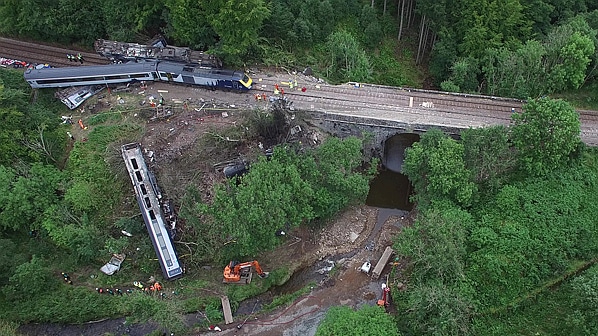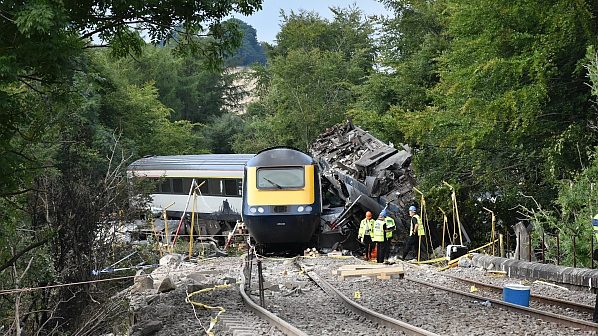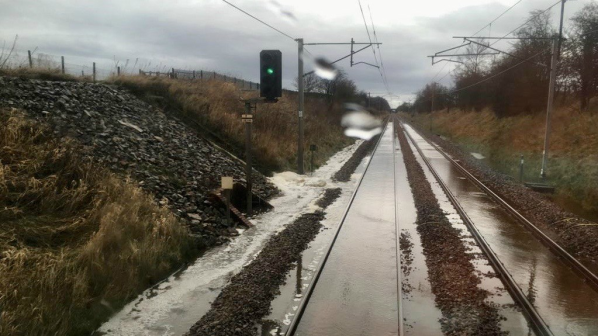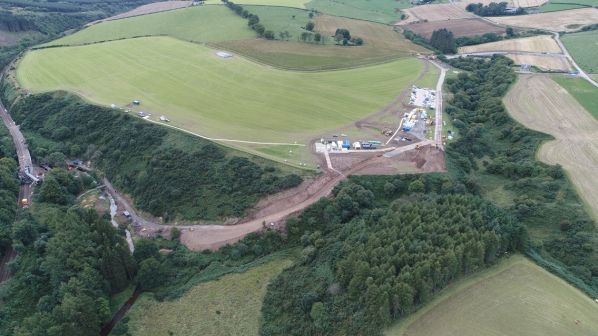BRITISH infrastructure manager Network Rail (NR) was fined £6.7m at the High Court in Aberdeen on September 8, have pleaded guilty to charges brought in relation to the fatal passenger train derailment that took place at Carmont near Stonehaven at 09.37 on August 12 2020.
The driver of the ScotRail service, its conductor and a passenger were killed after the train struck debris on the track that had been washed out of a drainage trench by heavy rain. After derailing, the High Speed Train (HST) collided with a bridge parapet, causing the train to come apart.
Of the HST’s four passenger coaches, the first came to rest on its roof at an angle of almost 90° to the track. The second coach also came to rest on its roof, while third coach ran down the steep embankment on the left side of the line and came to rest on its righthand side, subsequently catching fire. The six other people on the train were injured.
NR pleaded guilty to a number of maintenance and inspection failures before the crash.
In its report on the accident, the Rail Accident Investigation Branch (RAIB) had found that the drainage system had not been built in accordance with the original design. It was not able to safely accommodate the heavy water flows experienced on the morning of the accident when the average total rainfall for August fell in a three-hour period.
NR’s audit regime at the time of construction did not include audits likely to detect design modifications implemented on site without proper change control. RAIB said NR’s project team was probably unaware that the drain was significantly different from that intended and therefore did not act.
At the High Court, NR also admitted to failing to warn the driver that part of the track was unsafe or instructing him to reduce speed. The train was travelling at a speed of 117km/h when the accident took place, just under the normal line speed.
The court heard how the driver had asked the signaller if he should proceed at reduced speed after he had been instructed to return to Aberdeen as a blockage had been reported on his route to Glasgow. The driver was informed that he could proceed at normal line speed.
RAIB found that NR had no written processes in place at the time for issuing such precautionary instructions, and that route controllers had not been given the information, procedures or training required to effectively manage complex situations of this kind.
More widely, RAIB also found that NR management processes had not identified or addressed weaknesses in the way it mitigated the consequences of extreme rainfall events. Despite being aware of the risk, NR had not implemented additional control measures following previous events involving extreme weather and the management of operating incidents.
In passing sentence, Lord Matthews said that opportunities to take appropriate action may have been missed and that the level of culpability was high, with a large number of people exposed to risk over the years.
NR’s defence counsel, Mr Peter Gray, said that the accident had shook the company “to its core,” and that “its acceptance of its shortcomings was both immediate and genuine."
“Its response to ensure so far as reasonably possible that such tragedy should not be repeated was comprehensive and continues,” he said.
Following the derailment, NR inspected all similar locations across Britain and carried out a full survey of all types of trackside drainage in Scotland. It also made changes to how train operations are managed during severe weather, introducing a new expert control room team to provide real-time analysis of how weather conditions may affect operations.
Following sentencing, Mr Alex Hynes, managing director of Scotland’s Railway, spoke for NR. He said: “It is clear that our infrastructure was at fault for the accident, so it is right that Network Rail pled guilty.
“Since the accident, we have been working hard to make our railway safer and to learn the lessons of Carmont. We are absolutely committed to delivering on the recommendations made by the Rail Accident Investigation Branch in its report into the accident.
“We are also determined to build upon the significant changes that we have made since the accident, which have helped us to manage the risk of severe weather to the network.”
The prosecution followed a multi-agency investigation by Police Scotland, the British Transport Police (BTP) and the Office of Rail and Road (ORR) under the direction of Crown Office and the Procurator Fiscal Service.
Speaking after sentencing, Mr Ian Prosser, HM Chief Inspector of Railways at British safety regulator ORR, said: “Network Rail has made progress in implementing the safety recommendations that came from reviews of the failings that contributed to the accident.
“However, as highlighted in our 2023 annual ORR health and safety report, there remains much work to do as we all contend with the effects of climate change on our network.
“We must never forget what happened three years ago and we require the industry to be unrelenting in its work to maintain Britain's railway as one of the safest in Europe."




